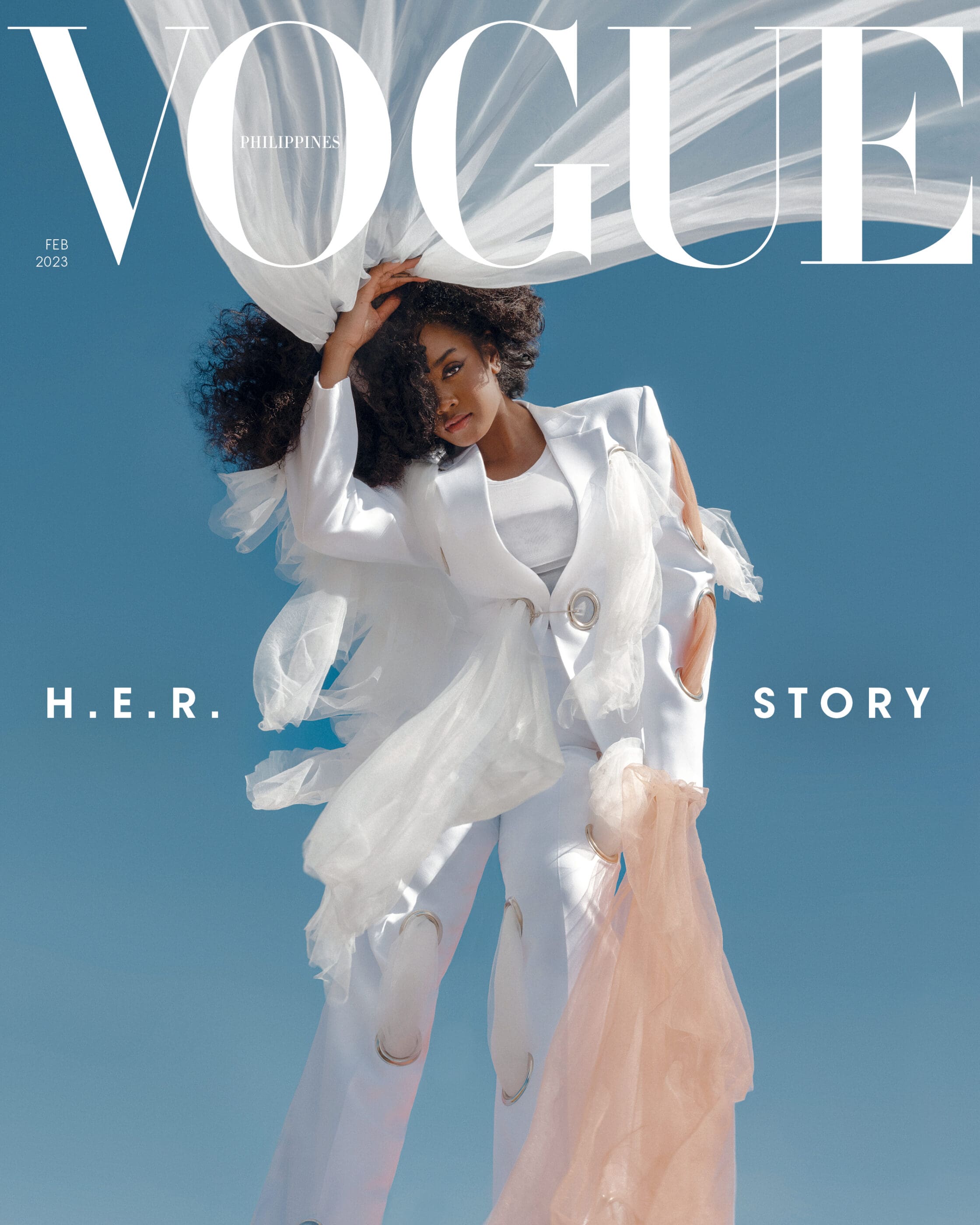RANDOLF white tulle and grommet suit set. Photography by SHAIRA LUNA
For Gabriella Wilson, the story of H.E.R. is one of evolution, roots, and revolution. We dig deep into the life of the Grammy and Oscar-winning global superstar.
Two days after Christmas, the Filipino-American R&B star H.E.R. paces around the hotel room barefoot, in drawstring shorts and an oversized Juneteenth tee, her natural hair in full bloom, while members of her glam team prepare her look for the trade event tonight and editors from Vogue Philippines sort through racks of gowns for her fitting. Finally, the doorbell rings. “Is that the palabok?” she asks, breaking into a smile.
It is, unfortunately, not pancit palabok, the Chinese-influenced Filipino rice noodle dish she ordered from room service, but the nasi goreng for her glam team. “When I’m here, I try to eat as much Filipino food as I can,” she explains.
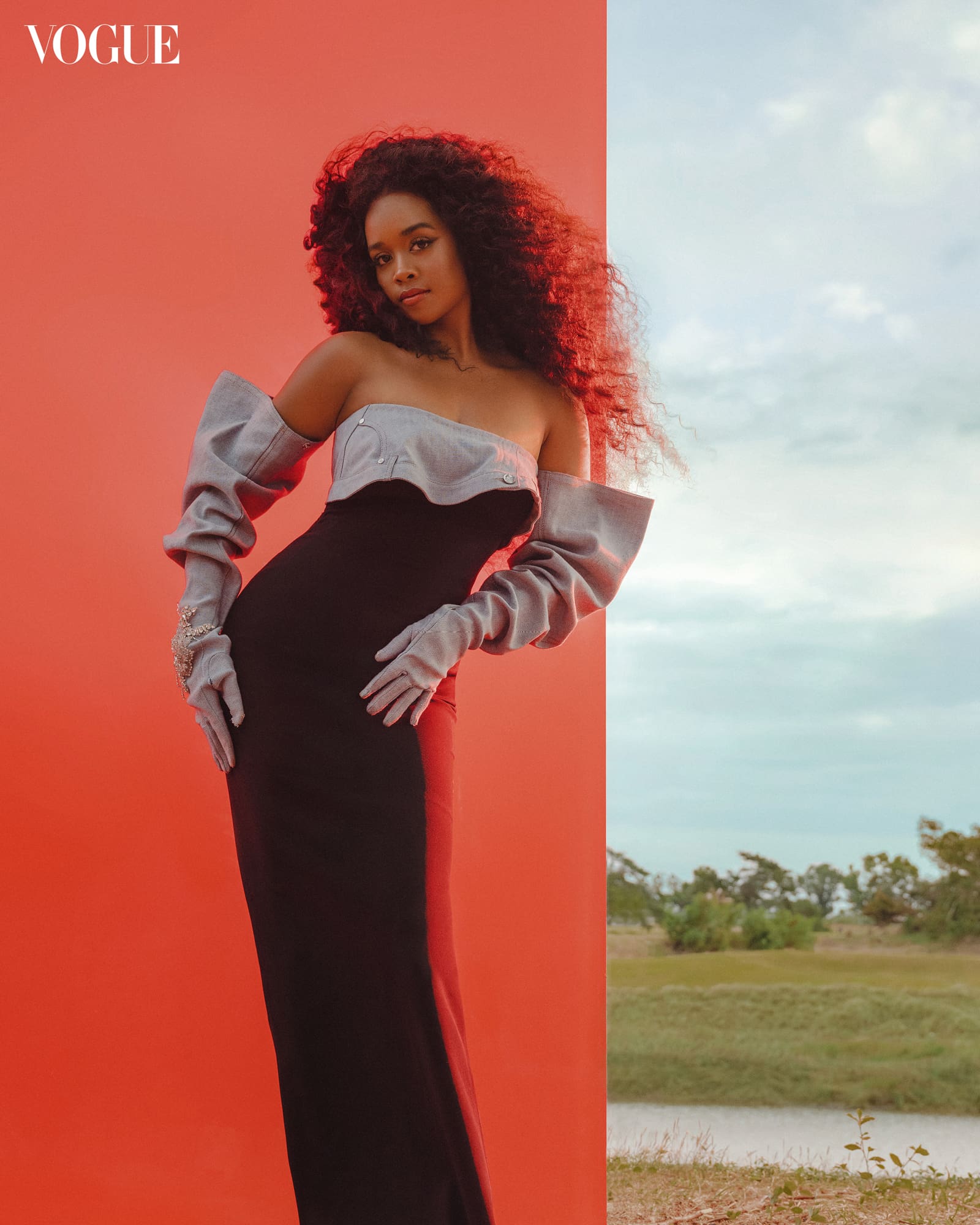
There seems to be a bit of that Sasha Fierce dichotomy in H.E.R. For someone who routinely shares the stage with some of music’s biggest names, H.E.R. in person is startlingly ordinary, carrying herself with none of the rock star swagger she uses to command the world’s biggest stages; instead, exuding unassuming warmth. To the team, she introduces herself as “Gabi” (she was born Gabriella Sarmiento Wilson) and to me, who she’s met on Zoom, she extends a hug.
The last few weeks of 2022 has been a whirlwind for the singer, songwriter and now actress, as she runs through the promo tour for Beauty and the Beast: A 30th Celebration, the star-studded ABC special where she made her star turn as Belle, becoming the first Black Filipino Disney Princess.
But life tends to be a whirlwind when you’re one of entertainment’s hottest, most in-demand talents. In the last 12 months, for example: She nabbed a role on the Oprah Winfrey-produced The Color Purple musical film, tore the roof off the Grammys with Lenny Kravitz, toured the world with Coldplay, and ended the year belting out the “Beauty and the Beast” theme song with Josh Groban.
H.E.R. is spending the holidays in the Philippines for work but also for family. In 2019, H.E.R. brought her immediate family home to the Philippines for a vacation—her first time in the country since she was four. Connecting with their Cabanatuan-based clan, visiting the place where her mother grew up and reuniting her mother with her sister after 15 years, H.E.R. and her family made a pact to start a family tradition and come back every year—a few days ago, she took her family to a luxury resort in Palawan.
That 2019 trip shifted something in H.E.R. “I got to see the house where my mom went as a child, where my grandparents lived, and the market she went to. She’s from Nueva Ecija, Cabanatuan City, the tricycle capital of the world,” she says. “It was a humbling experience too, just to see… Since that trip, I felt even more connected to my roots.”
“I always told her how I grew up with all the family members close by, we lived together,” her mom Agnes, who moved to Vallejo, California in 1989 when her uncle petitioned them, tells me. “In America, it’s kind of different, the lifestyle. They’re too busy working and they don’t really get together as much as we did. I always tell her how different Philippine culture and American culture are… She grew up knowing that what’s important to us is family.”
“I ran into Jo Koy today in the hotel [I’m staying at in Manila],” H.E.R. says, referring to the Filipino-American comedian. “And he was like, ‘We are so blessed that we get to do this for our family and it’s nothing if we don’t share it’… My family is such a big part of who I am and what I do and how I even got here… I never would’ve thought I’d be able to fly my family to the Philippines. It’s not an easy trip. It’s not a cheap one. You know what I mean? I’m just grateful. This is why I work hard.”
With an Oscar and five Grammys under her belt (as of press time at least—she’s up for four more at the 2023 Grammy Awards), the 25-year-old H.E.R. is just two letters away from a full EGOT, an acronym for the elite group of people who have won all four top awards in entertainment: the Emmy, the Grammy, the Oscar, and the Tony.
“My family is such a big part of who I am and what I do and how I even got here”
H.E.R.
Against all odds, she’s done all that while keeping the world at a distance. In an age that rewards constant disclosure, that seems to equate visibility with success, there’s something reassuring about the way Gabriella Sarmiento Wilson has become a star. After becoming a TV sensation in the late aughts as a child prodigy playing Alicia Keys covers on talk shows, she resurfaced a few years later as a teen R&B singer signed to J Records, the Clive Davis-founded label that housed R&B greats like Luther Vandross and Keys. In 2014, she released her first single “Something to Prove” under the name Gabi Wilson. Unfortunately, despite the benefit of a well-worn Isley Brothers sample, that single came and went in 2014, a pleasant enough slice of Top 40 R&B that somehow made her prodigious talents seem pedestrian.
What a difference two years makes. In 2016, Wilson reinvented herself as H.E.R., the enigmatic R&B singer-songwriter who made herself known with the electro-soul ballad “Focus.” In a year when the by-the-numbers EDM of acts like The Chainsmokers dominated streaming and radio, Wilson understood the strength of subtlety, going to number one on the R&B charts with a Quiet Storm track that demanded attention not with a bang but with a whisper. “Can you focus on me?” she sang. It was eventually nominated for the Best R&B Song Grammy.
“There were so many reasons why I wanted to be anonymous and why I wanted the music to shine,” H.E.R. tells me. “I had been through so much stuff that a young woman goes through. I wanted people to hear the message and really understand what I’m saying and not be so focused on what I look like or who I’m dating or what I’m wearing and all those things that to me, we started to focus on more because of social media. It was all about the ‘full package’ and the music came last.”
In the process, H.E.R. has become one of the few young artists to break through without the public really knowing who she was—and it’s become a gift and a curse.
“I feel like people know H.E.R. and they know the music, but it’s time for people to really get to know the person,” she says. “Throughout these past few years with success and all the great things that have happened, I think I’ve been moving so quickly… Now I’ve taken a second to be like, what do I want and who am I? I think that’s a coming of age moment.”
That renewed self-possession is apparent in Wilson’s personal style. Gone are the days when the artist hid behind sunglasses and big hair, shrouded in sweats and hoodies. The past few years have seen Wilson embrace bolder, more assertive looks, blossoming into a red carpet player.
“I tried in the beginning to make each fitting aspirational,” her stylist Wouri Vice, who has been working with her since she was 19, tells me. “So even though [we were doing a lot of] sweatsuits, there were pumps [in the fitting too]—not today, but maybe one day. And now you look and she’s sitting onstage with Michelle Obama wearing a sweatsuit and pumps… You’re literally watching the evolution of Gabriella Wilson.”
“Being 25, the things that worked when I was 18 and 20 don’t work for me now and the things that I want are different,” she says. “I know that’ll be forever changing, but I’m comfortable in that. I can’t tolerate anything or anyone that will try to take that away and try to make me something I’m not.”
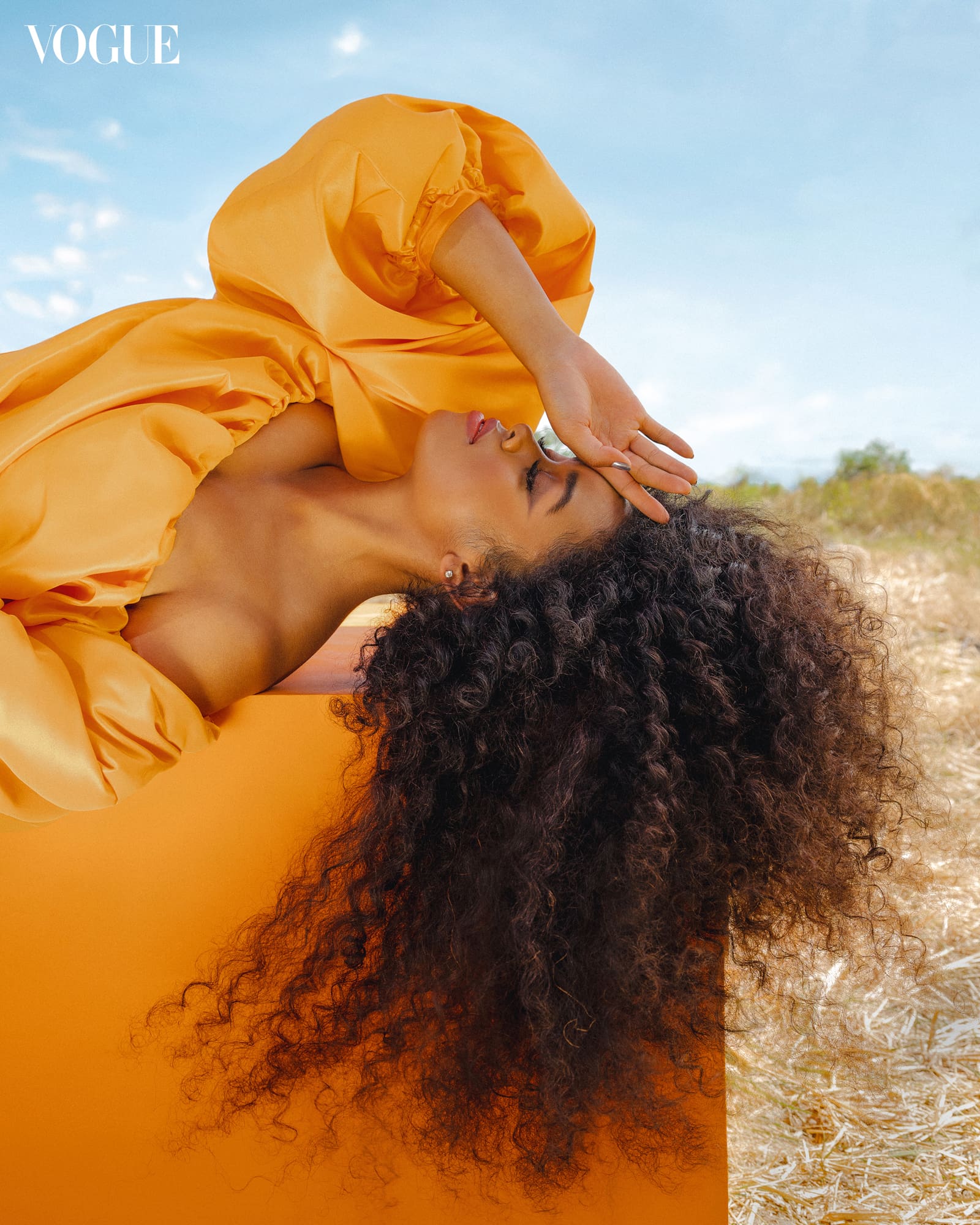
“I asked my mom to help me practice my Tagalog for this trip,” H.E.R. says, laughing. Like many second-generation immigrants, she can understand Filipino but not comfortably speak it. She is, however, shockingly well versed in Pinoy pop culture, a product of a Home Along Da Riles-watching household and conversant with the greatest hits of Sharon Cuneta, Gary V., and even Jay-R.
In recent years, as she’s shared more details about her personal life, H.E.R. has always made it a point to talk about the sacrifices her parents made to make her dreams happen. “They’re working-class people—my mom’s a nurse, my dad’s a construction worker. They didn’t have a lot of money to be able to just travel to New York to [take me to guestings],” she said on The View. “They really made it happen for me because they wanted to see me live out my dreams.”
She wears that history like a badge of honor, sometimes literally. Collaborating with the costume designer Marina Toybina for Beauty and the Beast, for example, she made sure it was aesthetically apparent that this Disney Princess is Black and Filipino, with the addition of Baybayin, an ancient Philippine script, to the apron.
“I said, ‘I want to pay tribute to my Filipino heritage. How can we do that?’… And [Toybina] has a friend who’s Filipino, who is an artist. He made that apron for me, hand painted the Baybayin on there and it says ‘Belle.’”
As part of the crop of Filipino-American stars—from pop juggernaut Olivia Rodrigo to actor-musician Dominic Fike to the rapper Saweetie—currently taking over Hollywood, H.E.R. has extended the same openness and enthusiasm to her peers. “I actually got Saweetie a chain,” she says. “I made it. It’s got the Filipino flag, the sun and the stars and it’s really cool. I got to give it to her… Our favorite Filipino food is sinigang, both of us.”
She’s trying to do the same with the people who’ve made her a star. “I want to find that connection with the people that love my music and know H.E.R but don’t really know Gabriella,” she says. “Organically I’ve opened up a lot more, but it’s hard.”
It’s something she sees in her own family. Recently, trying to know more about her family’s history, she found that older relatives weren’t keen to dredge up the past. “You start to understand yourself when you understand the roots of your family,” she says. “Good and bad things.”
“And sometimes you have to pull [the stories] out of them,” she continues. “Sometimes they’re like secrets. And it’s interesting, a lot of those family secrets, a lot of the trials and tribulations of the family, you start to learn those things. And I think it gives me the tools, how to break generational curses, how to want to operate differently, make certain decisions as a family, what I want my family to look like one day.”
“I’m processing who I am right now at 25 and who I want to be,” she says.
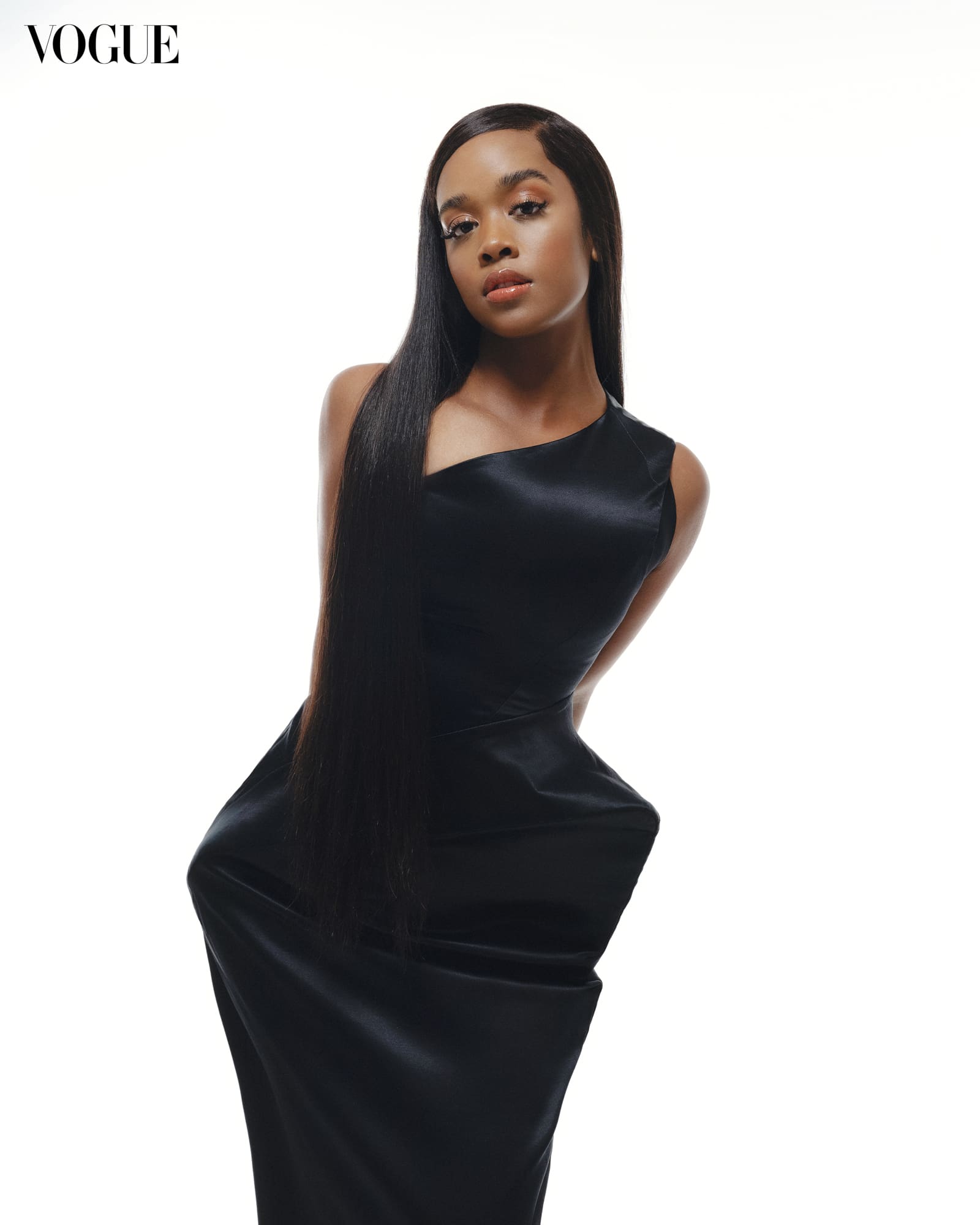
When she was 11, Gabi Wilson guested on an episode of Adobo Nation, a weekly magazine talk show on TFC. Short for The Filipino Channel, TFC is a global subscription channel that makes programs from the Philippines’ top network, ABS-CBN, available outside the country, becoming a direct link to Filipino life for many in the diaspora. For many immigrant Filipino families similar to the Wilsons, TFC is as much a part of life as Good Morning America is to Americans.
Watching the clip now, it’s astounding how much she had predicted for herself. Introduced as “the girl with ginormous talent,” Adobo Nation co-host Jaja Bolivar asks Wilson: “How do you see yourself five to 10 years from now?” Without skipping a beat, the 11-year-old says: “Well, hopefully a big musician, hopefully traveling, going on tour a lot and just doing stuff big.”
The hosts have heard that Wilson can sing in Filipino. “You know ‘Lupang Hinirang,’ the National Anthem, and a bunch of Filipino songs,” Karmina Constantino, one of the hosts, says. “[You say] you know one of our most favorite songs, ‘Maging Sino Ka Man’… I don’t believe you,” she tells the 11-year-old.
“Okay,” Wilsons answers with a nod, “I’ll sing it.” With preternatural self-possession, Wilson delivers a confident, prodigiously soulful rendition of the song that’s as indebted to the Sharon Cuneta version (her mom is a Sharonian) as it is to the contemporary R&B stylings of singers like Lauryn Hill. Her eyes visibly welling up, Constantino laughs, “Sorry, it’s my raging hormones.”
Fourteen years later, as an Oscar and Grammy-winning musician who’s most definitely traveling, going on tour a lot and doing stuff big, Wilson finds herself in the living room of the house in Cabanatuan that her mother grew up in, leading a group of her uncles, aunts, cousins, and mother in a rendition of “Maging Sino Ka Man.”
The performance is being recorded for a Vogue Philippines video but even the presence of a video crew can’t take away from the moment’s significance. “That was really exciting but at the same time, I was nervous,” her mother Agnes tells me the next day. “Because I wondered, how does the neighborhood look now? How does the house look now? I had not seen it for almost 30 years… I was a little sad at the same time because everything has changed.”
Roughly translated, the song “Maging Sino Ka Man” includes lines like: “And no matter what your past is / I will love you, no matter who you are… I love you because I love you / What they think isn’t important / I love you, no matter
who you are.”
“One thing someone told me a long time ago was, you can’t understand today without understanding yesterday,” Wilson tells me. “I feel so connected to myself and so much more connected to my mom, knowing what she sacrificed, what her life looked like before she came to America and the connection that she had with family and the importance of family.”
“That,” she says, “is the foundation of everything I do.”
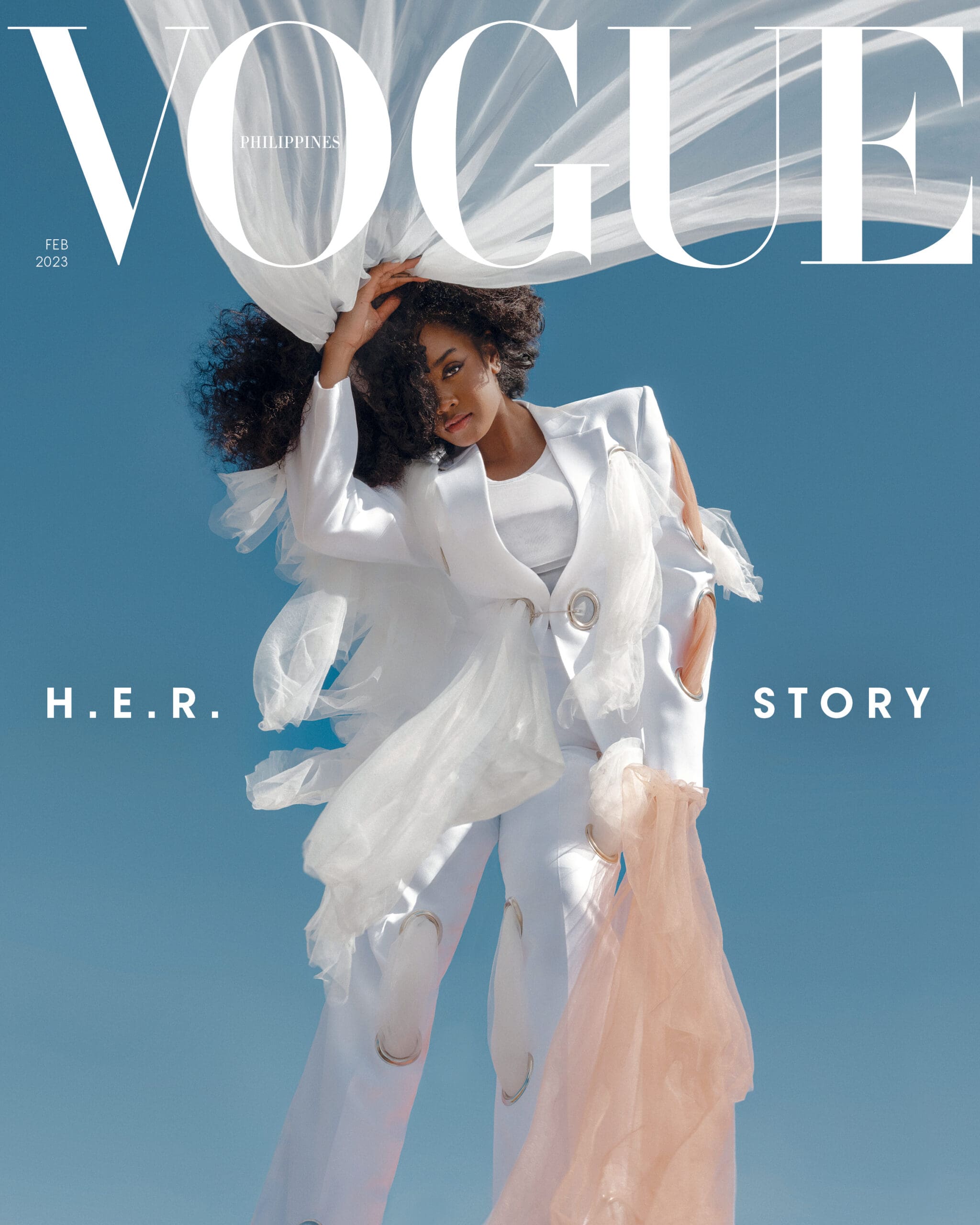
Photographs By Shaira Luna. Fashion Director Pam Quiñones. Styling By Daryl Chang and Wouri Vice. Makeup: Marissa Vossen. Hair: Nina Mercado. Nails: Extraordinail. Art Director: Jann Pascua. Beauty Editor: Joyce Oreña. Producer: Anz Hizon. Production Design: Justine Arcega-Bumanlag. Production Assistant: Bianca Zaragoza, Adam Pereyra, and Celine Mallari. Photographer’s Assistant: Lance Luna, Albert Calaguasn and Kiko Calaguas. Stylist’s Assistant: Renee De Guzman, Ticia Almazan, DeAndre DaCosta, Isabella Conti, and Nicholas Carlo. Production Design Assistants: Jan Abal, John Amon, Mario Taipen, Olderico Bondoc, Geber Cunanan, Nick Narte, and Cesar Grande. Video Team: Andy Tan, Ashley Yee, Ken Tan, and Garren Bustarde of Chapters PH. Shot on location at Cabanatuan, Nueva Ecija. Special thanks to Dr. Jean Cruz, Mayor Myca Vergara, Cong. Ria Vergara of the Local Government of Cabanatuan City, Aldrin Cerrado of ABS-CBN Global, Ray Brown, and Amal Mokhtar.
